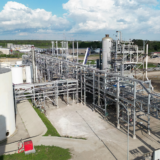
Industry collaboration key to advancing re-refined base oils
Industry leaders convened at F+L Week 2025 in Bali, Indonesia, to address the critical challenges facing the fuels and lubricants sector in Asia. A key topic of discussion was the lack of appreciation and adoption of re-refined base oils (RRBOs) in the region, highlighting the urgent need for industry-wide cooperation.
The panel discussion, held after the plenary session on 13 March, featured prominent industry figures, including Dony Strio Adi (PT Pertamina Kilang Internasional), Mansi Tripathy (Shell Lubricants), Werry Prayogi (PT Pertamina Lubricants), Sarah Horne (ExxonMobil Product Solutions), Dr. Alok Sharma (Indian Oil Corporation Ltd.), Eugene Ng (Chevron Oronite), Dr. Joel Garrett (Safety-Kleen Oil/Clean Harbors), and Sharmine Tan (Boeing). Together, they explored the major obstacles hindering the widespread use of RRBOs, as well as other industry critical issues, including sustainable fuels.
Collaboration essential for overcoming barriers
One of the primary hurdles identified was the collection of used oil. Many panellists stressed the importance of working collectively to address this issue. “You need to go at it collectively. If you don’t, you’re fighting a battle that is too big to win,” they noted. Establishing partnerships with major oil companies was highlighted as a crucial step towards effective re-refinement.
Tripathy underscored the slow progress in RRBO adoption due to fragmented industry goals and inconsistent government policies across different markets. “In many cases, there is no real direction and purpose, which complicates the adoption of RRBOs,” she remarked. She called for greater unity among stakeholders to define a clear vision that would accelerate the transition towards sustainable lubricants.
Policy, implementation, and education crucial for growth
Tripathy also emphasised that intent alone is insufficient. “Intent is not enough,” she stated. “Defining policy, working on implementation, and educating the market are the critical elements.” Without convincing original equipment manufacturers (OEMs) and customers of the benefits of RRBOs, adoption will remain sluggish, she warned.
The discussion also touched upon changing consumer perceptions. Horne highlighted the environmental advantages of RRBOs, particularly their potential to lower carbon emissions. However, she cautioned that quality control remains a critical factor. “The quality of re-refined base oils must be assured,” she noted. With the industry shifting from Group II to Group III base oils, understanding the chemical properties of used oils has become increasingly vital.
Scientific understanding of used oil must improve
According to the panellists, there remains a significant gap in the industry’s appreciation and scientific understanding of used oil. Without adequate analysis, companies risk missing opportunities to refine and manage these materials effectively, hindering the growth of RRBOs in the market.
The discussion at F+L Week 2025 underscored the pressing need for collaboration, regulatory clarity, and consumer education to drive the adoption of RRBOs. As the lubricants industry moves towards more sustainable solutions, stakeholders must work together to unlock the full potential of re-refined base oils.














